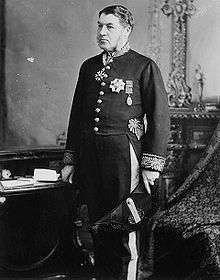7th Canadian Ministry
The Seventh Canadian Ministry was the cabinet chaired by Prime Minister Sir Charles Tupper. It governed Canada from 1 May to 8 July 1896. It was formed after the 7th Canadian Parliament was dissolved, and lost the 8th Canadian federal election, so it never faced a parliament. The government was formed by the old Conservative Party of Canada.
| 7th Canadian Ministry 7e conseil des ministres du Canada | |
|---|---|
7th ministry of Canada | |
 | |
| Date formed | 1 May 1896 |
| Date dissolved | 8 July 1896 |
| People and organisations | |
| Monarch | Victoria |
| Governor General | Marquess of Aberdeen |
| Prime Minister | Charles Tupper |
| Member party | Conservative Party (historical) |
| Opposition party | Liberal Party of Canada |
| Opposition leader | Wilfrid Laurier |
| History | |
| Predecessor | 6th Canadian Ministry |
| Successor | 8th Canadian Ministry |
Cabinet
- Prime Minister
- 1 May 1896 – 11 July 1896: Sir Charles Tupper
- Minister of Agriculture
- 1 May 1896 – 11 July 1896: Walter Humphries Montague
- Controller of Customs
- 1 May 1896 – 11 July 1896: John Fisher Wood
- Minister of Finance
- 1 May 1896 – 11 July 1896: George Eulas Foster
- Receiver General of Canada
- 1 May 1896 – 11 July 1896: The Minister of Finance (Ex officio)
- 1 May 1896 – 11 July 1896: George Eulas Foster
- 1 May 1896 – 11 July 1896: The Minister of Finance (Ex officio)
- Superintendent-General of Indian Affairs
- 1 May 1896 – 11 July 1896: The Minister of the Interior (Ex officio)
- 1 May 1896 – 11 July 1896: Hugh John Macdonald
- 1 May 1896 – 11 July 1896: The Minister of the Interior (Ex officio)
- Controller of Inland Revenue
- 1 May 1896 – 11 July 1896: Edward Gawler Prior
- Minister of the Interior
- 1 May 1896 – 11 July 1896: Hugh John Macdonald
- Minister of Justice
- 1 May 1896 – 11 July 1896: Arthur Rupert Dickey
- Attorney General of Canada
- 1 May 1896 – 11 July 1896: The Minister of Justice (Ex officio)
- 1 May 1896 – 11 July 1896: Arthur Rupert Dickey
- 1 May 1896 – 11 July 1896: The Minister of Justice (Ex officio)
- Leader of the Government in the Senate
- 1 May 1896 – 11 July 1896: Mackenzie Bowell
- Minister of Marine and Fisheries
- 1 May 1896 – 11 July 1896: John Costigan
- Minister of Militia and Defence
- 1 May 1896 – 11 July 1896: David Tisdale
- Postmaster General
- 1 May 1896 – 11 July 1896: Louis-Olivier Taillon
- President of the Privy Council
- 1 May 1896 – 11 July 1896: Auguste-Réal Angers
- Minister of Public Works
- 1 May 1896 – 11 July 1896: Alphonse Desjardins
- Minister of Railways and Canals
- 1 May 1896 – 11 July 1896: John Graham Haggart
- Secretary of State of Canada
- 1 May 1896 – 11 July 1896: Sir Charles Tupper
- Registrar General of Canada
- 1 May 1896 – 11 July 1896: The Secretary of State of Canada (Ex officio)
- 1 May 1896 – 11 July 1896: Sir Charles Tupper
- 1 May 1896 – 11 July 1896: The Secretary of State of Canada (Ex officio)
- Minister of Trade and Commerce
- 1 May 1896 – 11 July 1896: William Bullock Ives
- Minister without Portfolio
- 1 May 1896 – 11 July 1896: Donald Ferguson
- 1 May 1896 – 11 July 1896: John Jones Ross
- 1 May 1896 – 11 July 1896: Sir Frank Smith
Offices not of the Cabinet
- Solicitor-General
- 1 May 1896 – 11 July 1896: Sir Charles Hibbert Tupper
gollark: Indeed.
gollark: Lego is not turing complete because finite size.
gollark: Run RPNCalcv4 on bare metal.
gollark: Just use a computer.
gollark: Huh, these compression ratios are surprisingly good for small data.
References
- Government of Canada. "Seventh Ministry". Guide to Canadian Ministries since Confederation. Privy Council Office. Archived from the original on 2017-01-18. Retrieved 2010-07-01.
Succession
| Ministries of Canada | ||
|---|---|---|
| Preceded by 6th Canadian Ministry |
7th Canadian Ministry 1896 |
Succeeded by 8th Canadian Ministry |
This article is issued from Wikipedia. The text is licensed under Creative Commons - Attribution - Sharealike. Additional terms may apply for the media files.